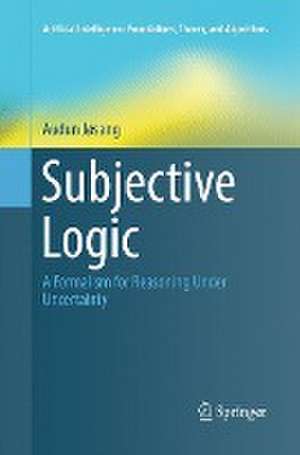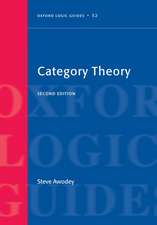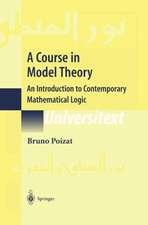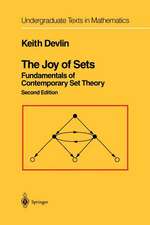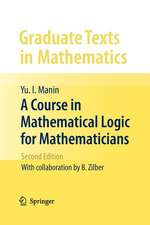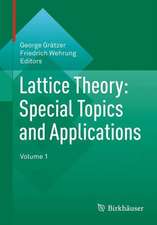Subjective Logic: A Formalism for Reasoning Under Uncertainty: Artificial Intelligence: Foundations, Theory, and Algorithms
Autor Audun Jøsangen Limba Engleză Paperback – 23 iun 2018
The book will help researchers and practitioners to advance, improve and apply subjective logic to build powerful artificial reasoning models and tools for solving real-world problems. A good grounding in discrete mathematics is a prerequisite.
| Toate formatele și edițiile | Preț | Express |
|---|---|---|
| Paperback (1) | 1340.61 lei 6-8 săpt. | |
| Springer International Publishing – 23 iun 2018 | 1340.61 lei 6-8 săpt. | |
| Hardback (1) | 1383.45 lei 6-8 săpt. | |
| Springer International Publishing – 4 noi 2016 | 1383.45 lei 6-8 săpt. |
Din seria Artificial Intelligence: Foundations, Theory, and Algorithms
- 20%
 Preț: 308.79 lei
Preț: 308.79 lei - 20%
 Preț: 269.01 lei
Preț: 269.01 lei - 20%
 Preț: 376.10 lei
Preț: 376.10 lei - 20%
 Preț: 330.24 lei
Preț: 330.24 lei - 20%
 Preț: 332.06 lei
Preț: 332.06 lei - 20%
 Preț: 816.54 lei
Preț: 816.54 lei - 20%
 Preț: 1383.45 lei
Preț: 1383.45 lei - 20%
 Preț: 593.48 lei
Preț: 593.48 lei - 20%
 Preț: 649.60 lei
Preț: 649.60 lei - 20%
 Preț: 461.53 lei
Preț: 461.53 lei - 20%
 Preț: 352.95 lei
Preț: 352.95 lei - 20%
 Preț: 1641.86 lei
Preț: 1641.86 lei - 20%
 Preț: 1046.06 lei
Preț: 1046.06 lei - 20%
 Preț: 303.41 lei
Preț: 303.41 lei - 20%
 Preț: 989.96 lei
Preț: 989.96 lei - 35%
 Preț: 336.99 lei
Preț: 336.99 lei
Preț: 1340.61 lei
Preț vechi: 1675.76 lei
-20% Nou
Puncte Express: 2011
Preț estimativ în valută:
256.53€ • 274.31$ • 213.89£
256.53€ • 274.31$ • 213.89£
Carte tipărită la comandă
Livrare economică 18 aprilie-02 mai
Preluare comenzi: 021 569.72.76
Specificații
ISBN-13: 9783319825557
ISBN-10: 3319825550
Ilustrații: XXI, 337 p. 119 illus.
Dimensiuni: 155 x 235 mm
Greutate: 5.45 kg
Ediția:Softcover reprint of the original 1st ed. 2016
Editura: Springer International Publishing
Colecția Springer
Seria Artificial Intelligence: Foundations, Theory, and Algorithms
Locul publicării:Cham, Switzerland
ISBN-10: 3319825550
Ilustrații: XXI, 337 p. 119 illus.
Dimensiuni: 155 x 235 mm
Greutate: 5.45 kg
Ediția:Softcover reprint of the original 1st ed. 2016
Editura: Springer International Publishing
Colecția Springer
Seria Artificial Intelligence: Foundations, Theory, and Algorithms
Locul publicării:Cham, Switzerland
Cuprins
Introduction.- Elements of Subjective Opinions.- Opinion Representations.- Decision-Making Under Vagueness and Uncertainty.- Principles of Subjective Logic.- Addition, Subtraction and Complement.- Binomial Multiplication and Division.- Multinomial Multiplication and Division.- Conditional Deduction.- Conditional Abduction.- Joint and Marginal Opinions.- Fusion of Subjective Opinions.- Unfusion and Fission of Subjective Opinions.- Computational Trust.- Trust Networks.- Bayesian Reputation Systems.- Subjective Networks.
Textul de pe ultima copertă
This is the first comprehensive treatment of subjective logic and all its operations. The author developed the approach, and in this book he first explains subjective opinions, opinion representation, and decision-making under vagueness and uncertainty, and he then offers a full definition of subjective logic, harmonising the key notations and formalisms, concluding with chapters on trust networks and subjective Bayesian networks, which when combined form general subjective networks. The author shows how real-world situations can be realistically modelled with regard to how situations are perceived, with conclusions that more correctly reflect the ignorance and uncertainties that result from partially uncertain input arguments.
The book will help researchers and practitioners to advance, improve and apply subjective logic to build powerful artificial reasoning models and tools for solving real-world problems. A good grounding in discrete mathematics is a prerequisite.
The book will help researchers and practitioners to advance, improve and apply subjective logic to build powerful artificial reasoning models and tools for solving real-world problems. A good grounding in discrete mathematics is a prerequisite.
Caracteristici
A critical tool in understanding and incorporating uncertainty into decision-making First comprehensive treatment of subjective logic and its operations, by the researcher who developed the approach Helpful for researchers and practitioners who want to build artificial reasoning models and tools for solving real-world problems
